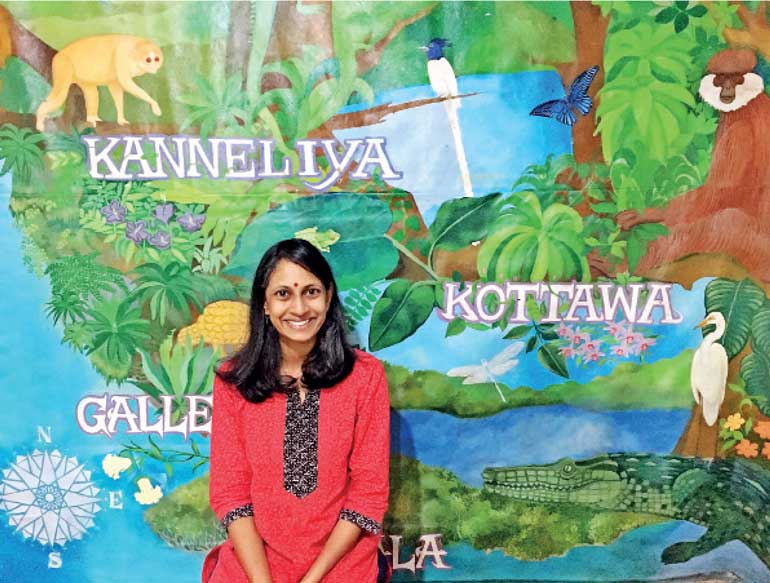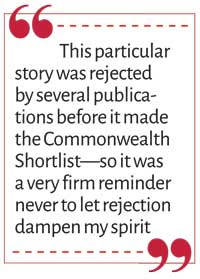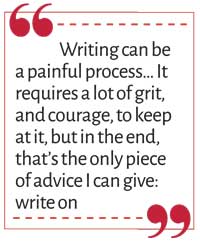Sunday Feb 15, 2026
Sunday Feb 15, 2026
Saturday, 10 July 2021 00:10 - - {{hitsCtrl.values.hits}}

Kanya D’Almeida, winner of the 2021 Commonwealth Short Story Prize – Credit: Quincy Saul, Artwork: Shanil Ratnaike
Beating off over 6,400 entries from 50 countries, last week Sri Lankan writer Kanya D’Almeida won the coveted 2021 Commonwealth Short Story Prize. Her gut-wrenching yet tender story interweaving love, decline and death, titled ‘I Cleaned The—’, focused on domestic workers, giving voice to those who do the ‘dirty work’. In this interview, Kanya speaks about the win and why she writes
 Q: First of all, congratulations once again on your wonderful win. What was your reaction when you received the news and a week later, how does it feel?
Q: First of all, congratulations once again on your wonderful win. What was your reaction when you received the news and a week later, how does it feel?
Disbelief followed by elation. This particular story was rejected by several publications before it made the Commonwealth Shortlist—so it was a very firm reminder never to let rejection dampen my spirit. I also feel so grateful for everything that made this win possible, including a panel of judges who were willing to slog through the unsavoury parts of my story to the bitter end!
As an acquaintance of mine recently wrote in an email: “Sixty-nine years ago when I was a student in London, ‘The Commonwealth,’ as it was presented to us, used to exclude every single phenomenon in this story.” I’m so glad I didn’t try to water it down, or make it more palatable to an international audience, or pull any punches.
Q: You’re the first Sri Lankan to win the overall prize and the second to win for the Asia region. What does this mean for you as a writer?
It makes me wish we did more to support our writers, and artists generally. I would not have written this story without the education I received in the United States—particularly my Master’s at Columbia University. Not only was I taught the craft of writing, I was taught so much about myself as a writer.
In Sri Lanka I had received very little critical feedback on my writing, only praise. But at Columbia, one of the first stories I submitted was torn apart by the professor. He cut whole pages with his red pen. In the margins he wrote: “This dialogue reads like lines in a play—and not a very good one!” It forced me to up my game. My dream is to host writing workshops for Sri Lankan writers to pass on a little of what I’ve learned along the way.
Q: Why did you write this story? What was the inspiration?
The birth of my son. The death of a family friend. The women who work in my house. Fierce arguments with my husband over domestic labour. My own feelings of inadequacy as a mother—in some ways, the character of Lila Missy represents my worst fears about myself, that I would be too weak to stand up to all the unexpected challenges that motherhood throws at you. Instead of suppressing those fears, I decided to let them play themselves out on the page. Writing the story was very therapeutic for me.
 Q: Your story explores love and injustice in its various forms. What does love mean to you? Justice?
Q: Your story explores love and injustice in its various forms. What does love mean to you? Justice?
A friend of mine recently wrote to me, “For the longest time I thought one’s love for another was determined by their willingness to die for them. Now I believe the true marker of love is one’s willingness to clean their shit.” I share this sentiment.
As for justice… I used to throw that word around a lot. Recently I’ve replaced this with the word dignity. If we recognise that everyone deserves to live and be treated with dignity, we are forced to challenge all of the economic, political and social systems that degrade, oppress and exploit us. In many ways my entire story is premised on the characters’ search not for justice for dignity.
Q: You’ve won this global prize at a time the world is battling a pandemic that has impacted the lives of every single person. How have you been coping with the pandemic?
My mother was my angel during the first lockdown. My husband couldn’t get back in the country, and she would insist that I spend at least half an hour every day on my fiction—she took the baby to another room and said: “Just go and write.” It’s entirely thanks to her support that I was able to submit the story.
Q: You’re currently working on a book of short stories about women suffering from mental illness. Could you tell us about it and when and how readers can access it and more of your writing?
The book is about mad women—not women with mental illness! Most of the women in my family are proudly mad, I would say. My father’s sisters especially love to use that expression to describe themselves, and because I look up to them so much I always saw it as a badge of honour. “I’m mad men. I’m mad, no?”
But more importantly, this idea of ‘madness’ has been used for centuries to control women: it has been used to curtail their anger about the oppression they are forced to live with, or criminalise their sexuality, or institutionalise them when they speak out or act out against patriarchy. And I just love exploring ways that women can reclaim madness and turn it into a source of power, and pleasure, and joy.
 Q: You also host ‘The Darkest Light’, a podcast exploring birth and motherhood in Sri Lanka – why?
Q: You also host ‘The Darkest Light’, a podcast exploring birth and motherhood in Sri Lanka – why?
I had a very traumatic birth experience, and for months afterwards I was in a very bad place. No one in my family, none of my friends, had warned me about the impacts of a negative birth, so I felt really alone. The prevailing attitude is that if you leave the hospital with a living child, you should just shut up and be grateful—not complain about how you were treated during labour and delivery.
But I couldn’t keep quiet about it. I was angry, and wounded, and I needed an outlet for it. So I started writing to people, calling people, interviewing people about their birth stories. What I have found, over two years of producing this podcast, is that a highly toxic birth culture has developed in Sri Lanka in the course of a single generation, roughly 30 years.
The podcast is an attempt to shed light on this, reclaim women’s stories of birth and motherhood, and challenge obstetric violence in all its forms.
Q: What are you reading right now and who are your favourite authors?
These days I don’t so much read as fall asleep with books on my face and chest! But some of the authors who have influenced me deeply over the years include Nawal El Saadawi, J. M. Coetzee, Sarah Waters, Alan Bennett and Ursula K. Le Guin.
Q: To close, why do you write, when did you start, and what words of advice can you share with aspiring writers?
A very dear professor told me he’d seen a lot of talent come and go through the hallowed halls of the School of the Arts at Columbia! In his experience, those who ended up being successful were not the ‘best writers’ but the ones who returned diligently to their work every single day. Writing can be a painful process. In my mind, I know exactly what I want a story to look and sound like but most days I end up producing a lot of rubbish. It requires a lot of grit, and courage, to keep at it, but in the end, that’s the only piece of advice I can give: write on.